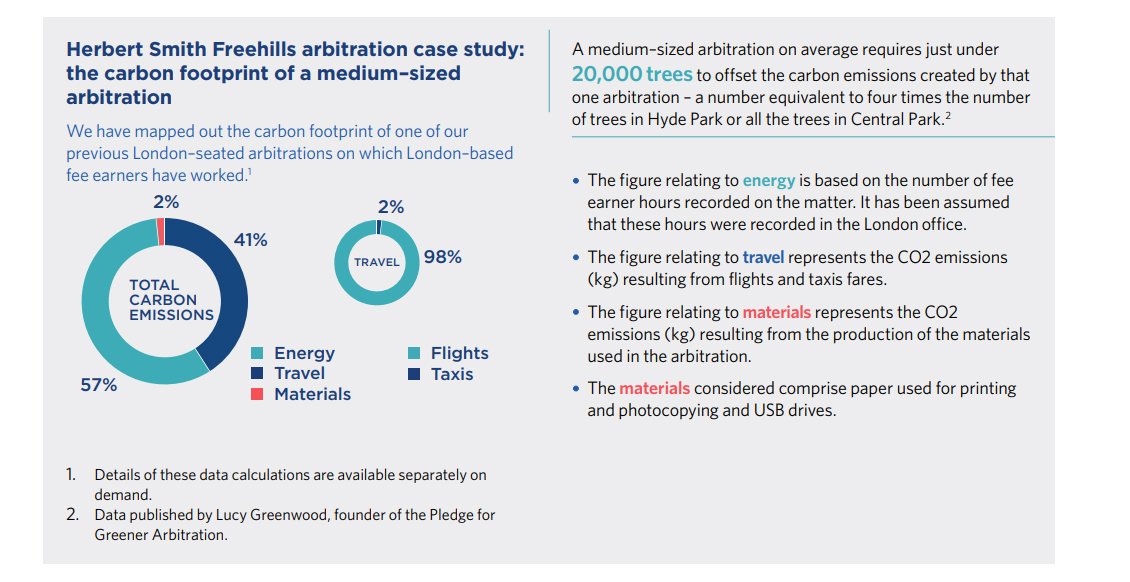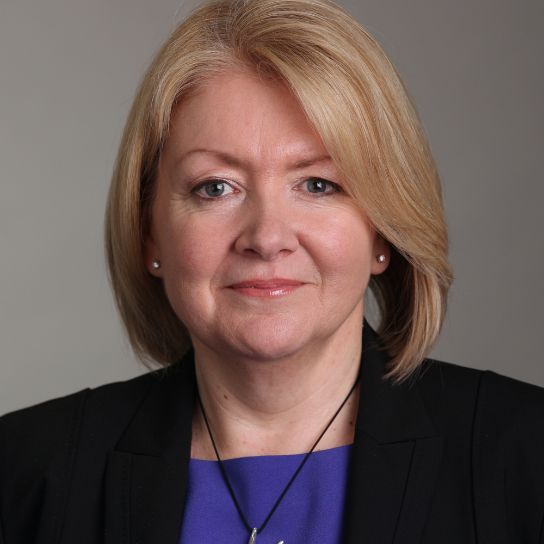Background
Around the globe, tackling climate change has now undisputedly become a political priority and an environmental necessity. This priority is reflected in the corporate world, where environmental sustainability now regularly features as a pillar for strategic growth for most multinational corporations, who are facing unprecedented pressure to react to calls for increased climate change mitigation action. As a result, a common response has been to set stringent environmental sustainability targets, with many major corporations having recently pledged to become carbon–neutral.1
The arbitration world has not been immune to this trend. Naturally, law firms have been setting their own sustainability targets, with Herbert Smith Freehills recently pledging to reach net–zero by 2030.2 Collaborative legal initiatives, such as the Chancery Lane Project,3 have sprung up from the ground to create practical legal solutions to help businesses and communities transition to net zero. In parallel, the arbitration community itself has formed its own task forces to tackle the reduction of carbon emissions arising from the work we do, from proceedings to the conferences we attend. In particular, the independent arbitrator Lucy Greenwood's Green Pledge has piqued the interest of the international arbitration community, prompting practitioners and arbitrators to consider the wider impact of their case management on the environment.4
The Covid–19 pandemic has also acted as an accelerator for an increased digitalisation of proceedings, introducing opportunities for practical ways to mitigate the carbon footprint of arbitrations, as the arbitration community has turned to virtual hearings, which are now a common occurrence, and forging a path for sustainable change in the way we work.
Striving for environmental sustainability
In 2020, the Campaign for Greener Arbitrations, spearheaded by Lucy Greenwood, was formally launched to raise awareness of, and mitigate, the significant carbon footprint of international arbitrations.5 The Campaign is based on Lucy Greenwood's Green Pledge which encourages commitment to creating a work space with a reduced environmental impact, corresponding electronically where possible, using videoconferencing as an alternative to travel, and avoiding printing, among other suggestions.
The Campaign for Greener Arbitrations' research sparked even more interest in sustainability in arbitration, as it revealed that just under 20,000 trees would be required to offset the carbon emissions resulting from a medium–sized arbitration.6 This is the surprising equivalent of four times the number of trees in Hyde Park or all of the trees in Central Park.
At Herbert Smith Freehills, the London–based international arbitration team also conducted related research, and analysed the carbon footprint of one party’s counsel in a medium–sized London–based arbitration. Herbert Smith Freehills' study identified two major carbon emitting sources in such arbitrations: the energy usage of the fee earners working on the matter and air travel.7 Our firm's study also identified and reviewed the use of materials comprising paper for printing and photocopying, and USB drives, as another carbon emitter.
The use of cleaner energy sources to combat the carbon emissions arising from energy usage, exploring effective alternatives to travel where possible, as well reducing any unnecessary material or electronic waste, are clear priorities for those looking to reduce the footprint of proceedings.
Such concerns appear to have arisen in parallel in the wider international arbitration community too, as the new LCIA and ICC Arbitration Rules reflect the special attention paid to environmental sustainability–related procedural aspects. For instance, Article 4.1 of the LCIA Arbitration Rules 2020 now provide for electronic means as the default for submitting a request for arbitration and the response thereto. Article 4.2 further provides that any written communication in relation to the arbitration shall be delivered electronically. The new ICC Rules have also shifted to electronic filing. In addition, Article 26(1) of the draft ICC 2021 Arbitration Rules also contain a new environment–friendly provision which enables arbitral tribunals to decide, after consulting the parties, and on the basis of the relevant circumstances of the case, that hearings may be conducted remotely by video–conference and there are equivalent provisions in the LCIA Rules 2020. These new kinds of provisions in arbitral rules may reflect the Covid–19 pandemic, but also highlight the potential for the reduction of travel and waste in international arbitration proceedings, as well as the crucial role which arbitral institutions and tribunals may play in managing cases in a sustainable manner.

Covid–19 as a driver for sustainable behaviour
In 2020, Earth’s “Overshoot Day”, which marks the date that humanity’s resource consumption surpasses the amount of resources that the Earth can produce in 12 months, took place one month later than in 2019.8 This change has been attributed in large part to the current Covid–19 pandemic, and the associated reduction in international and domestic travel amongst other things. The reduction in travel and the restrictions on in–person gatherings that have been implemented globally have forced the arbitration community to adapt – leading to a widespread shift to virtual meetings, interviews, hearings, networking events and conferences. As such, Covid–19 has forced the international arbitration community to adopt state–of–the–art technology and employ video–conferencing and electronic document sharing means almost exclusively. We have had the opportunity to take stock of what works, and what does not, and already we are seeing useful guidance being published on key topics such as the use of online case management platforms,9 virtual hearings and advocacy10.
Many of these virtual alternatives, in principle, will remain suitable following the pandemic and will assist in the reduction of the carbon emissions associated with arbitration proceedings and conferences in the longer run. They can also represent opportunities to help address other challenges in arbitration, such as diversity in representation (where physical and financial boundaries shift with a move to digital proceedings) and accessibility. These longer term changes do however require investment and access to the necessary technology and a reliable internet connection, which can also present its own challenges. Following the pandemic, it is to be expected that travelling and in-person hearings will resume to an extent. However, given the widespread and irreversible shifts in working patterns which will follow and, given the potency and success of the available technology to conduct virtual meetings and put together e– bundles, it is likely that the conduct of virtual proceedings will remain common, and that the use of paper and other single–use materials will be further reduced.
Herbert Smith Freehills' campaign on environmental sustainability in arbitration
In spring 2020, after many years of driving internal sustainability initiatives within the firm, Herbert Smith Freehills expanded these efforts externally, offering arbitration clients the possibility to conduct greener arbitrations to fit their own internal environmental sustainability targets and the circumstances of each case.
The London–based arbitration team of Herbert Smith Freehills has put together a menu of case management options which clients can adopt in the conduct of their arbitrations, as well as propose to their counterparties and arbitral tribunals at the first procedural conference in a case. Some of the considerations on which Herbert Smith Freehills has focused for the purpose of conducting greener proceedings throughout the duration of a case include, unsurprisingly, the reduction of air travel, the use of electronic correspondence, the offsetting of carbon emissions, the avoidance of e–waste and the increased use of our internal e–discovery capabilities as a carbon reduction tool.
Where appropriate, the firm also encourages arbitration clients to make a number of sustainable suggestions at the first procedural conference, including running a paperless arbitration and enabling witnesses to give evidence through video–conferencing where appropriate.
Herbert Smith Freehills also proposes a set of environmentally–friendly measures at hearings too. These include using technology to view relevant documents and avoiding printed bundles, as well as encouraging arbitrators to use video–conferencing when deliberating following the hearing, instead of meeting with their co–arbitrators in person.
The London–based arbitration team has benefitted from substantial support from the firm as whole in setting up its initiative on environmental sustainability in arbitration. This close and successful collaboration reflects Herbert Smith Freehills' long–standing commitment to working sustainably and promoting environmental sustainability globally.
Environmental sustainability at Herbert Smith Freehills
At Herbert Smith Freehills, we too have placed environmental sustainability at the forefront of our agenda. We are one of the few international law firms to have pledged to become a net–zero carbon firm by 2030.11 Our net–zero goal is supported by the Science Based Target Initiative to limit temperature rise to 1.5C, and will be achieved by using cleaner energy across our offices, working with suppliers committed to reducing emissions and supporting initiatives that remove carbon dioxide that the firm produces from the atmosphere.
Some of Herbert Smith Freehills’ recent global achievements in changing the way in which we work to reduce our carbon emissions in the longer term include:
- The achievement of our 2020 sustainability targets by reducing our carbon footprint by over 15%, energy use by over 10%, and paper consumption by over 30%;
- 100% of our energy in the London, Belfast, Brussels and Madrid offices comes from renewable sources;
- 80% of our entire global network is single–use plastic–free;
- The entire firm encourages recycling. Almost 50% of our global offices have swapped personal bins for centralised disposal to improve recycling rates; and
- The offsetting of all flights associated with the annual Global Partners Conference. In addition, many of our Practice Leaders and Partners have taken the initiative to offset all of their flights.
Given our deep–seated commitment to environmental sustainability and established efforts in this space, we are confident that we are well–placed to continue our progress to longer term more sustainable practices and to reaching our net zero target. Please get in touch if you would like to hear more about our sustainability in arbitration campaign and our sustainability and climate change– related training offering.
- For instance, in January 2020, Microsoft pledged that, by 2030, it will become carbon negative and, by 2050, it will remove from the environment all the carbon which it has emitted either directly or by electrical consumption since its establishment in 1975 – read more here. In February 2020, BP announced its intention to go carbon–neutral by 2050 – read more here.
- Herbert Smith Freehills “'Carbonneutral’ and ‘Net Zero Carbon’: What's the Difference – and why does it matter?”, 2 December 2020, available here.
- Read more here.
- Campaign for Greener Arbitrations, "The Green Pledge", available here.
- Campaign for Greener Arbitrations, "The campaign" – read more here.
- Campaign for Greener Arbitrations, "A significant impact" – read more here.
- Inside Arbitration – Issue 10, "Towards greener arbitrations: achieving greater environmental sustainability in the way we work" – read more here.
- In 2019, Overshoot Day occurred on 29 July, compared to 22 August in 2020 – read more here and here.
- See the Protocol for Online Case Management in International Arbitration, available here.
- See for example the HKIAC Guidelines for Virtual Hearings, the Delos Checklist of Holding Arbitration and Mediation Hearings in Times of COVID–19, the African Arbitration Academy Protocol on Virtual Hearings in Africa, the Seoul Protocol on Video Conferencing in International Arbitration and the CIArb Guidance Note on Remote Dispute Resolution Proceedings.
- Read more here.
Key contacts
Legal Notice
The contents of this publication are for reference purposes only and may not be current as at the date of accessing this publication. They do not constitute legal advice and should not be relied upon as such. Specific legal advice about your specific circumstances should always be sought separately before taking any action based on this publication.
© Herbert Smith Freehills 2024



